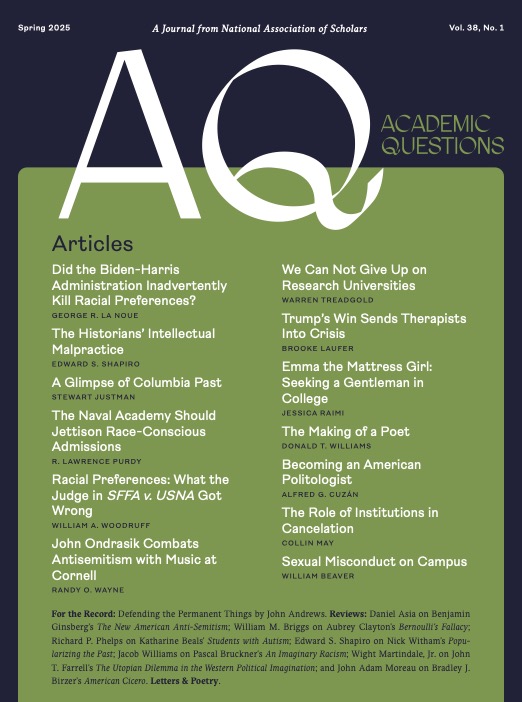One day after President Biden’s inaugural address stressing national unity, he signed an “Executive Order on Advancing Racial Equity and Support for Underserved Communities Through the Federal Government.” He created another Executive Order in February 2023, this time expanding the equity mandate to the operation of every federal program. These actions were not just rhetorical flourishes. The EOs had a powerful impact. Scores of new preferential programs were created administered by hundreds of Diversity, Equity, and Inclusion officers scattered throughout the federal bureaucracy.1 The Department of Health and Human Services alone had 501 DEI and equity employees at a cost of $68.1 million.2
Moreover, the funding these agencies controlled influenced behavior in those seeking grants, particularly in higher education where obtaining research awards may determine career outcomes. A U. S. Senate Committee report found that 3,483 National Science Foundation grants worth $2.05 billion, or more than 10 percent, of its total awards furthered specific DEI objectives. Projects of this type grew from 0.3 percent in 2021 to 27.2 percent in 2024.3
The great irony in all of this is that the Biden-Harris administration’s equity overreach created a judicial pushback, that will make future efforts to achieve those ends very difficult.
As Kamala Harris had explained on the 2020 campaign trail there is a big difference between equal treatment of individuals and group equity. Under equity she suggested, “We all end up in the same place.” To achieve equal outcomes for dissimilar groups various forms of preferences are the quickest tool. She meant it. Early 2024 October poll results alarmed the Harris-Walz campaign. Although their ticket garnered 95 percent support among black women, only 80 percent of black men were on board. Consequently, Harris issued a nine-page proposal “Vice President Harris Will Deliver for Black Men.” It suggested that the federal government offer special economic benefits, including one million federal forgivable loans of up $20,000 to black men who wanted to create businesses.4
Some states began to follow “equity” redistribution efforts. In Minnesota, for example, Governor Tim Walz signed a May 2023 law providing state grants to help “emerging” farmers make down payments to buy land. A wide range of persons were prioritized for the limited state appropriations available, unless they were able bodied heterosexual white men. The preferred groups were “women, American Indians or Alaskan Natives, members of communities of color, lesbians, gays, bisexuals, transgenders, queers, intersexes, or asexuals (LGBTQUIA+).” Perhaps those priorities attracted the Harris campaign when she chose Walz as her Vice-Presidential candidate.
On January 2, 2024, the Pacific Legal Foundation challenged the race and sex priorities on equal protection grounds in a Minnesota federal court. (Lance Nistler v. Tim Walz, C.A. No.24 -cv-186). Five months later before a judicial decision could be reached, Waltz quickly signed legislation removing the racial and sexual priorities, either because he was getting better legal advice or because he thought defending such a discriminatory program would not go over well on the campaign trail.5
At the federal level, however, the Biden-Harris administration fought to defend their race and sex preferential programs until federal courts stopped them. As part of its Covid relief funding, restaurants owned by minorities and women were prioritized, even though funds were likely to run out before white male owners were permitted to apply. When that race and sex priority was challenged in 2021, the Sixth Circuit found it unconstitutional. More significantly, the majority set out new strict scrutiny standards that were to be controlling whenever any government employs such preferences.
The government has a compelling interest in remedying past discrimination only when three criteria are met. First, the policy must target a specific episode of past discrimination.
Second, there must be evidence of intentional discrimination in the past. Statistical disparities don’t cut it, although they may be used as evidence to establish intentional discrimination.
Third. The government must have had a hand in the past discrimination it now seeks to remedy. (Vitolo v. Guzman. 999 F.3d 353, 361).
Another Covid relief program forgave 120 percent of federal loans only to minority farmers and ranchers.6 The race-based beneficiaries did not even have to be currently in arears in their United States Department of Agriculture (USDA) loans. A 2021 federal rule had stopped all debt collections, foreclosures, and evictions for borrowers of any race. Nevertheless, Agriculture Secretary Thomas Vilsack announced that USDA would immediately forgive 13,000 to 15,000 loans to non-white food producers at a potential cost up to $4 billion. USDA announced that the Biden-Harris Administration is committed “to equity across the Department by removing systematic barriers and building a workforce more representative of America.” These USDA racial loan preferences were struck down by four federal district courts all over the country—Wynn v. Vilsack, 545 F. Supp. 3d 1271 (M.D. Fla. 2021); Faust v. Vilsack, 519 F. Supp. 3d 470 (E.D. Wisc. 2021); Miller v. Vilsack, No. 4:21-cv-0595, 2021 WL 1115194 (N.D. Tex. 2021); Holman v. Vilsack, No.21.-1085, 2021 WL 2877915 (W. D Tenn. July 8.2021). The lesson was not learned. USDA continued with a program that denied white farmers disaster relief funds which was quickly stuck down in 2024—Strickland v. Vilsack, No: 2-24-cv-00060-Z. 2024 WL 2886574, (N. D Texas, June 7, 2024).
Most important in 2023, the Supreme Court handed down its long-awaited Students for Fair Admissions decision(SFFA) (600 U.S.181 (2023). The Court found Harvard University and the University of North Carolina-Chapel Hill violated the Equal Protection Clause of the Fourteenth Amendment which requires that no State shall “deny to any person…. the equal protection of the laws.” Justice Gorsuch, in concurring, also thought those campus admission procedures violated Title VI of the Civil Rights Act of 1964, which forbids discriminating against any person based on race, color, or national origin from participation in any program or activity receiving Federal financial assistance. The Department of Justice (DOJ) argued to preserve racial admissions preferences and Biden nominated Justice Ketanji Brown Jackson’s dissent agreed, causing pointed rejoinders from the majority about her opinion’s omission of the development of equal protection law.
In July 2023, following up on Vitolo and incorporating SFFA, a federal district court found the race preferences in the federal contracting 8(a) program were unconstitutional— (Ultima Serv. Corporation v. U.S. Dep’t of Agriculture, 683 F.Supp.3d 745 (E.D. Tenn. 2023). The key judicial finding was that the decades long practice in many federal programs of “presuming” that persons identifying with certain racial and ethnic groups were “socially and economically disadvantaged” and thus eligible for preferences was illegal. The groups entitled to the presumption came from 55 countries on four continents. Litigation discovery revealed that the Small Business Administration’s (SBA) group classifications were irrational and not regularly reviewed. For example, Pakistanis got the benefits of the presumption, but Afghans did not. The SBA responded by giving up the “presumption” that all minority owned firms were socially and economically disadvantaged, replacing it with a purportedly race neutral individual essay application process.
In another 2023 case, a federal district court found the Biden-Harris Administration’s policy for its new Minority Business Development Agency (MBDA) regional service centers violated the Fifth Amendment’s equal protection guarantee. These centers were supporting firms whose owners were from some races and ethnicities, if they were not white. The MBDA was begun in the Nixon administration, but the race exclusive Biden service center approach resulted in first a preliminary injunction and then in March 2024, a court mandated national permanent injunction and payment of $350,000 to the plaintiffs’ attorneys—Jeffrey Nuziard et.al. v. Minority Business Development Agency et. al. No.4:23-cv-00278-P, 2024 WL 4416885 (N.D. Tex. April 26, 2024).
The U.S. Department of Transportation’s Disadvantaged Business Enterprise program had survived multiple challenges over its four-decade existence. On September 19, 2024, however, a federal district court ruled that its presumption of social and economic disadvantage status for certain minorities which supported racial preferences in federally funded contracts lacked both a compelling interest and narrow tailoring—Mid-America Milling Company v. US. DOT, 2024 WL 4367183 (E.D. Ky.).
Federal courts have concluded that the Constitutional standard is equal protection for individuals not equity for groups. The Biden-Harris Administration’s equity policies were so egregious, that even preferential programs created decades ago were found unconstitutional under newly created judicial rules. DOJ attorneys did not risk appeals in any of these cases, so the Biden-Harris Administration was zero for nine in defending racial preference programs.
Harris campaign proposal of special benefits for black men would have been dead on arrival on the steps of almost any federal courthouse. Further, there is no sign that it won any votes from black men, who still supported her, but at much lower rates than past Democrat Presidential candidates. Nor did her black men preference policies enhance her appeal to other minorities who increased their previous support for Trump. On the other hand, white men who may have understood what an “equity” agenda meant for their futures were the strongest Republican voters.
Judicial conclusions that racial and ethnic categories are imprecise and stereotypical in modern America will be difficult to overcome regardless of political pandering. Those kinds of preferences were raised and rejected in Vitolo,Ultima, Nuziard, Mid-America and most significantly in SFFA. In that case, Chief Justice Roberts stated bluntly for the majority “Eliminating racial discrimination means eliminating all it.” That is probably not the civil rights legacy the Biden-Harris Administration intended. It is a lesson higher education needs to learn, however. Preferences for whole racial or ethnic groups deemed underrepresented or marginalized as so many campus DEI program advocate are unconstitutional.
George R. La Noue is Emeritus Professor of Public Policy and Political Science at the University of Maryland Baltimore County; [email protected]. He is the author of Silenced Stages: The Loss of Academic Freedom and Campus Policy Debates (Carolina Academic Press, 2019). La Noue last appeared in AQ with “DEI Hiring Statements: Common Good Ethics or Partisan Loyalty Oaths?” in the Summer 2023 issue.
1 Office of Personnel Management, “Government-wide DEIA: Our Progress and Path Forward for Building a Better Workforce for the American People,” Annual Report 2022.
2 Alex Welz, “HHS Spent Hundreds of Millions of Dollars on DEI Initiatives Under Biden Watchdog Finds, National Review, November 11, 2024; The Editorial Board, “The Biden-Harris Race Preference Regime,” Wall Street Journal, November 14, 2024.
3 U. S. Senate Committee on Commerce, Science, and Transportation, Ranking Member Ted Cruz, “D.E.I. Division. Extremism. Ideology. How the Biden-Harris Administration Politicized Science,” October 9, 2024.
4 Ja’han Jones, “Kamala Harris unveils plan for Black men as Election Day nears,” October 13, 2024, https;//www.msnbc,com.the reidout blog/ kamala-harris—black-men-policy-proposal-election-day-rcna175327.
5 “Minnesota ends race-based grant policy,” https://pacificlegal.org./case/nisler-mn-farm-down-payment-discrimination.
6 Kathianne Boniello, “Judge halts Biden’s $4B financial aid program for farmers of color,” New York Post, June 12, 2021.














